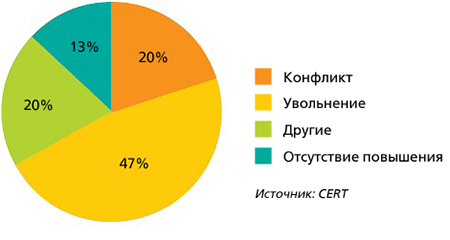Exact revenge to your heart's content?
Friday, May 25, 2018
More often than not, economic fluctuations, rather than employers, are responsible for drops in employees' real income and purchasing power. But the need to cut back on spending often gives rise to hatred toward… companies that supposedly do not value their employees' work highly enough. The solution seems obvious: if your salary isn't high enough, turn to a company that will offer you more. But in our hi-tech era, some people choose the hollow path of digital sabotage.
As revenge acts, disgruntled employees often opt to engage in digital sabotage: they infect corporate computers and leak, steal, or corrupt data.
However, low salaries or bleak career prospects serve as sufficient motive only in 13% of cases involving revenge.
Dismissal from a job can also trigger an attack on a company's digital assets.
Dismissals provoke revenge in 47% of the incidents.
Conflicts with other employees (including former staff members) serve as a motive in 20% of the cases.
A grudge makes people seek revenge. But by doing so, they also damage their company’s assets, which can be punishable by law—but who thinks about consequences when their soul is hungering for revenge?
Conflict — 20%; Dismissal — 47%; Other — 20%; No promotion — 13%;
Unpleasant incidents precede sabotage in 92% of the cases.
Regardless of the cause for revenge, sabotage is rarely spontaneous. Indeed, revenge is a dish best served cold. Other people are aware of the sabotage plans in 31% of the incidents: colleagues account for 64% of them, 24% are friends and family members, and accomplices account for 14%.
The Anti-virus Times recommends
- Companies must protect their assets and employees from hostile actions by their disgruntled, angry, and dissatisfied colleagues.
- Maintaining a productive and friendly working environment is important for any company. Don't shut your eyes to situations when employees display their dissatisfaction with their company in an overtly hostile manner. Determine the cause of a conflict before words turn into actions.
- Don't take steps to prevent sabotage only after an employee (one who falls into a potential risk group) quits their job since damage can be inflicted while the individual is still a staff member. Employees of this sort should only have access to the assets they need to do their job. Access to digital materials can be restricted using the Office Control component included in Dr.Web corporate anti-virus solutions.
- Back up your important information regularly to keep it safe from disgruntled avengers.
- And be sure to change all of an employee's passwords as soon as they quit.



![Shared 0 times [Twitter]](http://st.drweb.com/static/new-www/social/no_radius/twitter.png)
Tell us what you think
To leave a comment, you need to log in under your Doctor Web site account. If you don't have an account yet, you can create one.
Comments
vasvet
17:18:22 2018-06-16